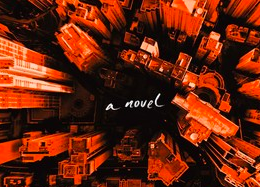Matt Gallagher builds a strange but familiar world in his new novel, Empire City. An incredible mix of speculative genres, he has a science fantasy, alternate history/future, superhero, dystopian view on what would happen to our country, and in some ways the world, if America had won the Vietnam War. Framed with epigraphs from Thomas Hobbes and a British Foreign Service Officer who worked closely with the American military in Iraq, Emma Sky, we are led into this alternate world thinking about the way that Hobbes claims that power can be of service, but also with the Sky quote, “America doesn’t deserve its military.” Gallagher will spend the next 350 pages showing readers that, while Hobbes’s perspective is possible, Sky’s proclamation is true.
But that all sounds a little erudite, right? With compelling characters and a dark setting rivaling any DC superhero movie, Gallagher creates a future that exposes the faults in our present. We become invested in three major characters, Sebastian Rios, Mia Tucker, and Jean Jacques Saint-Preux, who show us this world through their viewpoints and their feelings. All of them were in one incident where a bomb changes their physical capabilities, along with some other peripheral characters, and we see the impact of that event on their lives. Gallagher builds a microcosm of a military and political conflict in the New York-esque streets of Empire City where he plays out the scenario. He sets high-speed events into motion, appealing to a sense of action and adventure and, in the end, criticizing the political apparatus of this alternative America for its inhumane treatment of military members who resemble the active duty and veteran community we have in America today.
Gallagher takes on Carl von Clausewitz’s famous idea that war is politics by other means and questions whether the politics are keeping in mind who is conducting their business in foreign countries. His biggest question seems to be whether or not human life can be an appropriate payment for political goals. The Hobbes epigram is “what quality soever maketh a man beloved, or feared, of many; or the reputation of such quality, is power; because it is means to have the assistance and service of many,” which touches on qualities found in all people who can exert power. In a May 2011 article for American Political Science Review, Arash Abizadeh notes that “[Hobbesian war] arises because we are fragile, fearful, impressionable, and psychologically prickly creatures susceptible to ideological manipulation, whose anger can become irrationally inflamed by even trivial slights to our glory.” Gallagher juxtaposes the selfish nature of Hobbes’s ideas against Emma Sky’s sense that our country doesn’t deserve our military. The unwitting or at least righteous military are “all-in” and serving their cause, while politicians are manipulating their ideological frameworks to develop a sense of enemy and do the politicians’ dirty work. In this scenario, Gallagher makes the argument that the average military member is not to blame for the moves their government makes for power.
Despite the depth of Gallagher’s ideas and the ideology he espouses, Empire City is a terrific action story that has just enough fantasy in it to spark a variety of interests. The dirty bomb the characters experience gives them special capabilities. Each of them can do things no other humans can do, yet the government has insisted on damping down or controlling those capabilities. Gallagher has created an all-star line-up of heroes, and now we need a sequel to learn how they are going to make this alternative America a better place.
One of the points Gallagher nails perfectly is the rote words the people of this different America always use. People will say to different veterans “Praise to the Victors” or “America honors the warfighter” and the automatic reply is “The honor is ours.” The words are a perfect parallel to today’s “Thank you for your service,” and, at least in Gallagher’s rendition, there is an expected reply while, in today’s world, most of us veterans are left awkwardly saying “You’re welcome,” which is inadequate. The phrases are different for different veterans, though. In the same way we honor WWII veterans as The Greatest Generation, the Vietnam veterans in Gallagher’s novel are “Victors” and “The Next Greatest Generation” while the newer people are of “The Found Generation” and their service members are “warfighters.” Gallagher slips around our known phrases and habits, these familiar statements with a twist, to create an authentic America whose parallels to the one we will create in our future are fairly direct.
But Gallagher’s novel is also one that will likely be worth digging into again and again. With more time to chart out the references, a careful reader could annotate each place Gallagher’s alternate history/future departs from our own. There is a Nixon Memorial in “Federal City,” (a parallel to Washington D.C.?) and mentally and physically wounded veterans are shipped off to colonies, including “Triangle Island” which bears quite a bit of resemblance to Ellis Island. Rich with non-traditional material between chapters such as a press release, a blurb for an impending movie, a sixth-grade history exam, and “FREEDOMBOOK” posts that are the approved news for the nation, Gallagher even presents a book review about the memoir of a rehabilitation colony guard. These extra resources scattered throughout the novel give us glimpses into the differences between our world and the one Gallagher has created with simple comments such as “If Americans cared about the war policies being carried out abroad in our name, My Brothers’ Keeper [the fictional novel being reviewed] would be atop every best seller list there is. We don’t, though, which is why last week’s lists were headed by another book on Sinatra’s extramarital affairs as vice president.”
We follow our three (super) heroes whose perspectives rotate from the civilian, Sebastian Rios, to the honorably discharged amputee, Mia Tucker, to the model “Volunteer” soldier-on-display, Jean Jacques Saint-Preux, through a series of events that set up a pseudo warzone right in Empire City. Gallagher builds the tension through various conflicts that help each of our characters learn just a little more about the power behind the manipulations they are each unwittingly a part of. Each of them must decide if they are going to join in the separate power groups they are serving or isolate themselves from the massive government and resistance machinery that will move ahead without them.
By the end of the novel, even as Gallagher successfully makes his ethical argument, I want more in all the best ways. His fantastic imagination makes me want him to play out more scenarios because I believe he could be prescient about the types of real-world conflicts that lay ahead. The tight world he creates in the novel is superbly rendered and complete. Selfishly, I want him to continue the project with a sequel that expands our view.
Ultimately, Gallagher bookends the novel’s ideological framework by re-addressing the concerns that wars are fought selfishly, for the people who run nations rather than the people who fight the wars. The most damaged, living warfighters in Gallagher’s novel are isolated from ordinary citizens’ view, living in prison-like colonies and subject to government whims. He opens the novel with Sky’s exhortation that America doesn’t deserve its warfighters. He ends it with a revolutionary leader, Veteran Zero, warning this alternate America that has damaged so many of his followers “If we should have left our brothers’ and sisters’ bleached bones in those distant sands in vain—then beware. We will get our due. We will take our due. For those who have borne the battle. Beware the anger of the warfighter, America. Our time has come. Beware the wrath of our legion.” Perhaps Gallagher imagines a world where warfighters finally show politicians that war is not the answer.
MaxieJane Frazier
MaxieJane is retired Senior Military Faculty from the United States Air Force Academy and an author/editor. Her writing has been published in The Willa Cather Review, The Routledge Companion to Literature and Food, as well as anthologies of critical essays. A graduate of the Bennington Writing Seminars, she is currently working on a novel and a military memoir.








